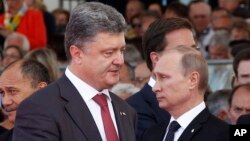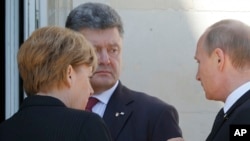U.S. President Barack Obama and Russian President Vladimir Putin held brief talks on the sidelines of D-Day anniversary celebrations in Normandy, France, on Friday.
A White House official confirmed the two met for about 15 minutes after a luncheon for world leaders at the Chateau de Benouville.
Obama made clear to Putin that de-escalating the crisis in Ukraine depends upon Moscow recognizing President-elect Petro Poroshenko - scheduled to take office Saturday - as the country's legitimate leader, ceasing support for pro-Russia separatists in eastern Ukraine, and stopping the provision of arms and materiel across the border, a White House representative said.
Obama urged Putin to immediately collaborate with the Kyiv government to reduce tensions, warning that failure to do so would deepen Russia's isolation, the representative said.
Earlier in the day, Putin and Poroshenko met informally with German Chancellor Angela Merkel. They talked informally as they walked into the chateau.
French officials were quoted as saying Putin and Poroshenko discussed a possible ceasefire between Ukrainian government forces and pro-Russian separatists.
Russian news agencies quoted Putin's spokesman, Dmitry Peskov, as saying that during their conversation, both leaders called for "a speedy end to to the bloodshed in southeastern Ukraine and to the military actions of both sides - the Ukrainian armed forces and the supporters of the federalization of Ukraine."
French President Francois Hollande had personally invited Putin to the D-Day commemoration, in recognition of at least 20 million Soviets killed during World War II. Reuters, on Twitter, reported Hollande's office as saying Putin and Poroshenko shook hands.
Western officials had expressed hope that informal contacts between Putin and Poroshenko during the one-day event can help ease tensions over Ukraine's future, after Russia seized and annexed the Crimea region following the ouster of a pro-Russian president in Kyiv in February.
A day earlier, he met British Prime Minister David Cameron and Hollande to discuss Moscow's role in the unrest.
The commemorations in Normandy have brought together world leaders, many of whom are urging Moscow to stop its support for the ongoing pro-Russian separatist rebellion in eastern Ukraine.
Violence continued in the region Friday. Ukraine's Interior Ministry reported that separatists in the city of Slavyonsk fired a mortar at checkpoints set up by security forces, killing a member of the ministry's special forces and seriously wounding two others.
Also Friday, separatists claimed they shot down a manned reconnaissance plane over Slovyansk. Several videos purporting to show the downing of the aircraft were posted to the Internet.
Dialogue encouraged
On Thursday, Obama had urged Russia to negotiate directly with the newly elected Ukraine government, and he called on Putin to stop the cross-border flow of armed Russian militias into Ukraine.
At a G7 meeting in Brussels earlier that day, leaders warned that more economic sanctions could come within weeks if the Kremlin fails to curb its support for the rebels.
The United States and Britain have been the leading proponents of sanctions on Russian businesses and individuals in Putin's inner circle - but both countries have so far stopped short of harsher penalties on key Russian economic sectors.
France and Germany, which maintain strong energy and trade ties with Russia, have been less aggressive in their public statements.
The Brussels summit was originally scheduled as a G8 in the Russian Black Sea resort of Sochi. But after Russia annexed Ukraine's Crimean peninsula in March, Western powers rejected Putin's invitation and moved the summit to Brussels.
VOA White House correspondent Luis Ramirez contributed to this report. Some information was provided by Reuters.
A White House official confirmed the two met for about 15 minutes after a luncheon for world leaders at the Chateau de Benouville.
Obama made clear to Putin that de-escalating the crisis in Ukraine depends upon Moscow recognizing President-elect Petro Poroshenko - scheduled to take office Saturday - as the country's legitimate leader, ceasing support for pro-Russia separatists in eastern Ukraine, and stopping the provision of arms and materiel across the border, a White House representative said.
Obama urged Putin to immediately collaborate with the Kyiv government to reduce tensions, warning that failure to do so would deepen Russia's isolation, the representative said.
Earlier in the day, Putin and Poroshenko met informally with German Chancellor Angela Merkel. They talked informally as they walked into the chateau.
French officials were quoted as saying Putin and Poroshenko discussed a possible ceasefire between Ukrainian government forces and pro-Russian separatists.
Russian news agencies quoted Putin's spokesman, Dmitry Peskov, as saying that during their conversation, both leaders called for "a speedy end to to the bloodshed in southeastern Ukraine and to the military actions of both sides - the Ukrainian armed forces and the supporters of the federalization of Ukraine."
French President Francois Hollande had personally invited Putin to the D-Day commemoration, in recognition of at least 20 million Soviets killed during World War II. Reuters, on Twitter, reported Hollande's office as saying Putin and Poroshenko shook hands.
Western officials had expressed hope that informal contacts between Putin and Poroshenko during the one-day event can help ease tensions over Ukraine's future, after Russia seized and annexed the Crimea region following the ouster of a pro-Russian president in Kyiv in February.
A day earlier, he met British Prime Minister David Cameron and Hollande to discuss Moscow's role in the unrest.
The commemorations in Normandy have brought together world leaders, many of whom are urging Moscow to stop its support for the ongoing pro-Russian separatist rebellion in eastern Ukraine.
Violence continued in the region Friday. Ukraine's Interior Ministry reported that separatists in the city of Slavyonsk fired a mortar at checkpoints set up by security forces, killing a member of the ministry's special forces and seriously wounding two others.
Also Friday, separatists claimed they shot down a manned reconnaissance plane over Slovyansk. Several videos purporting to show the downing of the aircraft were posted to the Internet.
Dialogue encouraged
On Thursday, Obama had urged Russia to negotiate directly with the newly elected Ukraine government, and he called on Putin to stop the cross-border flow of armed Russian militias into Ukraine.
At a G7 meeting in Brussels earlier that day, leaders warned that more economic sanctions could come within weeks if the Kremlin fails to curb its support for the rebels.
The United States and Britain have been the leading proponents of sanctions on Russian businesses and individuals in Putin's inner circle - but both countries have so far stopped short of harsher penalties on key Russian economic sectors.
France and Germany, which maintain strong energy and trade ties with Russia, have been less aggressive in their public statements.
The Brussels summit was originally scheduled as a G8 in the Russian Black Sea resort of Sochi. But after Russia annexed Ukraine's Crimean peninsula in March, Western powers rejected Putin's invitation and moved the summit to Brussels.
VOA White House correspondent Luis Ramirez contributed to this report. Some information was provided by Reuters.














